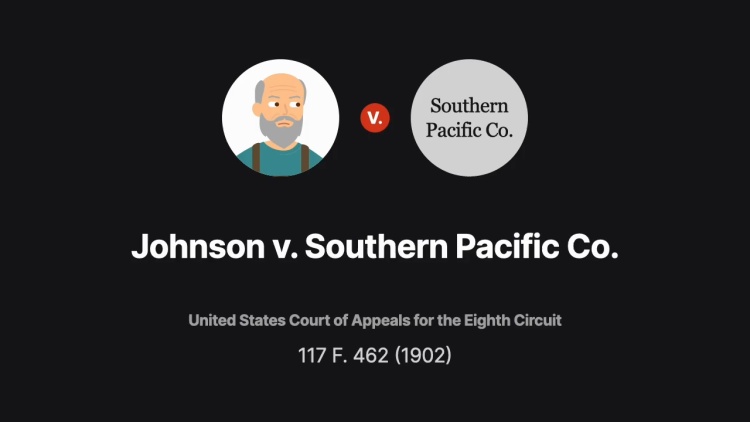Johnson v. Southern Pacific Co.
United States Court of Appeals for the Eighth Circuit
117 F. 462 (1902)
- Written by Salina Kennedy, JD
Facts
Southern Pacific Co. (railroad) (defendant) operated passenger trains that ran between San Francisco and Ogden, Utah. The trains on this route included a dining car, which was attached to a train leaving San Francisco and taken to Ogden. The car was then detached from the train, turned around, and attached to a train traveling back to San Francisco. On August 5, 1900, one of the eastbound trains ran late, making it impossible to get the dining car to Ogden in time to attach it to the intended westbound train. The dining car was left on a side track in another town in Utah so that the westbound train could stop and pick it up on its way to San Francisco. Johnson (plaintiff), the head brakeman on the westbound train, was instructed to couple the train’s engine to the dining car. The engine and the dining car had incompatible automatic couplers, requiring Johnson to manually couple them. As he did so, Johnson’s hand was crushed and was later amputated. Johnson sued the railroad for personal injury. The trial court directed a verdict for the railroad, reasoning that Johnson had assumed the risk of injury. Johnson appealed, arguing that the railroad’s failure to outfit the engine and the dining car with compatible automatic couplers was a violation of federal law and therefore shifted liability for Johnson’s injuries to the railroad. The federal statute enacted to improve railroad safety required locomotive engines used in moving interstate traffic to have power brakes and required train cars used in moving interstate traffic to have automatic couplers. Railroads were assessed a $100 fine for each violation of the statute.
Rule of Law
Issue
Holding and Reasoning (Sanborn, J.)
Concurrence (Thayer, J.)
What to do next…
Here's why 907,000 law students have relied on our case briefs:
- Written by law professors and practitioners, not other law students. 47,100 briefs, keyed to 996 casebooks. Top-notch customer support.
- The right amount of information, includes the facts, issues, rule of law, holding and reasoning, and any concurrences and dissents.
- Access in your classes, works on your mobile and tablet. Massive library of related video lessons and high quality multiple-choice questions.
- Easy to use, uniform format for every case brief. Written in plain English, not in legalese. Our briefs summarize and simplify; they don’t just repeat the court’s language.





